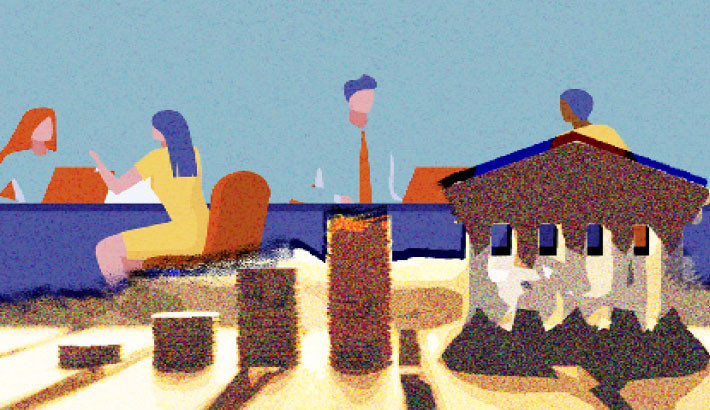Banks offer higher interest rates on short-term deposits
Daily Sun Feature
Published: 27 Feb 2025

Recently, banks have been offering higher interest rates on short-term deposits, especially those with durations of less than a year, drawing the attention of many savers looking for ways to grow their money in a relatively short time without committing to long-term investments.
There are four main types of banks – government-owned banks, specialised banks, foreign-owned banks and private banks. Among these, private banks currently offer the highest interest rates on short-term deposits, making them a popular choice for savers who want to grow their money quickly, according to Bangladesh Bank data.
Experts said one of the main reasons banks offer higher interest rates on short-term deposits is to attract more customers to park their money in the bank. Unlike long-term deposit schemes, short-term depositors can access their funds after a shorter period, which is more attractive for people who require liquidity but still want to earn interest on their savings.
Additionally, banks may adjust their rates in response to market conditions and economic factors such as inflation, changes in central bank policies and the demand for loans. In a fluctuating economic environment, offering higher interest rates on short-term deposits helps banks maintain a competitive edge and increase their deposit base.
Interest rates on fixed deposits in different types of banks
The interest rates on fixed deposits (FDs) in banks vary significantly depending on the type of bank and the deposit duration. In Bangladesh, the average interest rates for FDs with durations of less than one year and more than one year differ between private banks, government banks, specialised banks and foreign banks. Here is a breakdown of the interest rates for FDs across different categories of banks:
Private commercial banks
Private banks currently offer the highest interest rates on FDs. For FDs with a maturity of less than one year, the average interest rate is 9.58%. For FDs with a term of more than one year, including Deposit Pension Schemes (DPS), the average interest rate stands at 9.42%. It makes private banks attractive for savers looking to earn higher returns on their short- and long-term deposits.
State-owned commercial banks
Government-owned banks, on the other hand, offer comparatively lower interest rates on FDs. For a one-year fixed deposit, the average interest rate is 8.69%. For fixed deposits with a term of more than one year, including DPS, the average interest rate is 8.44%. These rates are generally lower than those offered by private and specialised banks, reflecting a more stable and less risk-oriented nature of government-backed banks.
Specialised banks
Specialised or development banks, which focus on specific sectors like agriculture, development and rural financing, offer lower interest rates than private banks. For FDs with a term of less than one year and longer-term FDs and DPS, the average interest rate is 7.86%. These banks tend to have a more niche customer base and provide essential services in specific sectors, such as farmers or rural development. Therefore, their deposit rates are somewhat lower.
Foreign commercial banks
Foreign-owned banks in Bangladesh generally offer the lowest interest rates on fixed deposits. For FDs with a maturity of less than one year, the average interest rate is 6.84%, while for those with a term of more than one year, the rate drops to 5.75%. These banks primarily cater to corporate clients and high-net-worth individuals, which may explain their more conservative approach to retail deposits.

